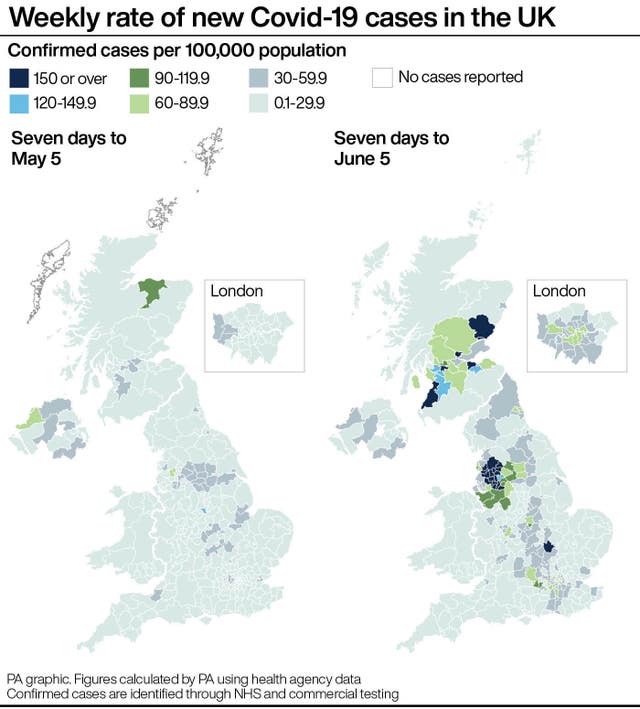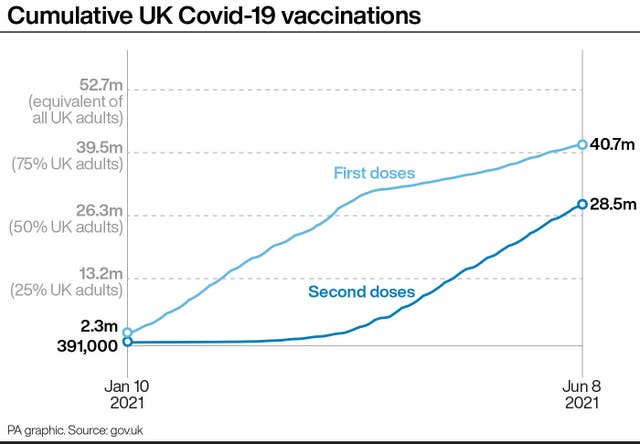Ordering earlier lockdown would have been against scientific advice – Hancock
The Health Secretary said he told the NHS in January 2020 to ‘plan on the basis of a reasonable worst-case scenario’ of 820,000 deaths.

Matt Hancock has said he was aware at the start of the pandemic that 820,000 people could die from Covid-19 but that ordering an earlier lockdown would have meant going against scientific advice.
The Health Secretary was being questioned over allegations made by the Prime Minister’s former aide, Dominic Cummings, to the Health and Social Care Committee and Science and Technology Committee.
Mr Hancock told MPs he had “no idea” why Mr Cummings had a dispute with him, but had later become aware that he had wanted him fired.
Asked why the Government had missed for six to eight weeks early in 2020 the signs that the death toll could be large, the Cabinet minister said: “Well, I would absolutely say that we knew about this problem from the start.
“And the challenge in those early weeks of March was making a massive judgment – probably the most significant judgment that any Prime Minister has made in, certainly in peacetime, based on incomplete information, and a great pace.”
He said he instructed the Department of Health and the NHS to “plan on the basis of a reasonable worst-case scenario” in January 2020, signed off at Cobra on January 31, for 820,000 deaths, based on Spanish flu estimates.
He said he was “determined that that would not happen on my watch” and “so throughout February, we were planning for how to stop that, and how to deal with the consequences if it came true”.
He said that by March 3 there had been no deaths and just 50 confirmed cases, but by the week beginning March 9 the “data started to follow the reasonable worst-case scenario”, and by the end of the week the projected numbers “were on a scale that was unconscionable”.
Asked why he and others had not seen the enormity of what was coming, Mr Hancock said: “The clear scientific advice at the time was that there was a need to have these tools like lockdown at your disposal but also that the consequences and the costs of lockdown start immediately and, critically, the clear advice at the time was that there’s only a limited period that people would put up with it, would put up with lockdown.
“Now that proved actually to be wrong.”

Mr Hancock insisted he had scrutinised the advice but “ultimately we didn’t know how long people would put up with it and now it seems obvious that people will put up with lockdowns – it was not at all obvious.
“These are huge decisions; to take those decisions against the scientific advice is an even bigger decision to take.”
He said “challenging the scientific advice is one thing, but overruling a scientific consensus is much harder, especially when the costs of the lockdown are immediate and are obvious.”
Earlier, the Health Secretary denied lying to Boris Johnson at any point during the pandemic, telling MPs he has always been driven by an approach of “honesty and integrity”.
Asked by Science Committee chairman Greg Clark if he ever said anything to the Prime Minister that he knew to be untrue, Mr Hancock replied: “No.”
He struck back at Mr Cummings, saying that the Government “has operated better in the past six months” since the controversial aide left Downing Street.
Asked if he knew the former adviser wanted him to be fired, Mr Hancock told MPs: “Yes, because he briefed the newspapers at the time. Or somebody briefed the newspapers; I now have a better idea who that was.”
Later, he took aim at Mr Cummings again, saying the public had noticed that the operation of Government had improved since November, the month that Mr Cummings left.
“And, in fact, the public trust across the UK in the measures that the Government have taken has increased significantly,” he said.
“I’ve noticed as Secretary of State, that it is now more efficient, more effective, there’s better communication inside of Government, there’s a better sense of teamwork, and that is so important in a pandemic, and the public have undoubtedly noticed this improvement over the past six months or so.”
Mr Hancock said he had “no idea at the time that there were others who were not as supportive as I might have hoped” regarding his 100,000 tests a day target, adding he was a “bit surprised” by Mr Cummings’ testimony on that point.
Mr Cummings told the committee that Mr Hancock’s public promise to deliver 100,000 tests a day by the end of April 2020 was “incredibly stupid” because it was already an internal goal.

Mr Hancock told MPs the Prime Minister had always been “four square” behind him on the target.
Asked by Mr Clark if Mr Johnson had had a conversation with him in April 2020 expressing surprise about untested people being discharged to care homes – as alleged by Mr Cummings – Mr Hancock said: “Not that I can remember.”
On discharging untested people, he said the “challenge was not just that we didn’t have the testing capacity” but there were concerns that people would be falsely told they did not have the disease.
“At the same time, the clinicians were worried that, because it took four days to turn a test around, that if they leave somebody in hospital for those four days they might catch Covid and therefore go back to a care home with a negative result but having caught it,” he added.
Matt Hancock said the Government had tried to throw a “protective ring” around care homes but that it had proved difficult.
“I think the most important words in the sentence are: ‘we tried to’. It was very hard,” he said.
The Health Secretary said it was “telling” that Mr Cummings had not produced any evidence to back up his allegations against him.

“Throughout this I have got out of bed every morning with the view and the attitude that my job is to do everything I could to save lives and get this country out of the pandemic,” he said.
“I approached that with a mission-driven determination to make it happen. I tried to do that with an approach of honesty and integrity and critically answering questions both in public and in private to the best of my ability.”
Later, he added: “I know, I know deep in here, that what I did and what my team did, was what we believe to be the best thing we could on the information that we had to protect lives and to get us out of this pandemic.
“And we worked every day from the moment we woke up, to the moment that we fell into our beds, on that mission for months and months and months, and I know that I can face the mirror each morning.”
Mr Hancock said he first heard evidence from China that there was asymptomatic transmission of coronavirus in January 2020 but was told by the World Health Organisation that it was “likely a mistranslation”.
He said he “bitterly” regrets not overruling advice that there was no asymptomatic transmission, later adding that the UK will probably face another pathogen “like this in less than 100 years”.
Minutes from a Scientific Advisory Group on Emergencies (Sage) meeting from January 28 point to evidence that some asymptomatic transmission was occurring, while in early February, Sage warned ministers: “Asymptomatic transmission cannot be ruled out and transmission from mildly symptomatic individuals is likely.”





